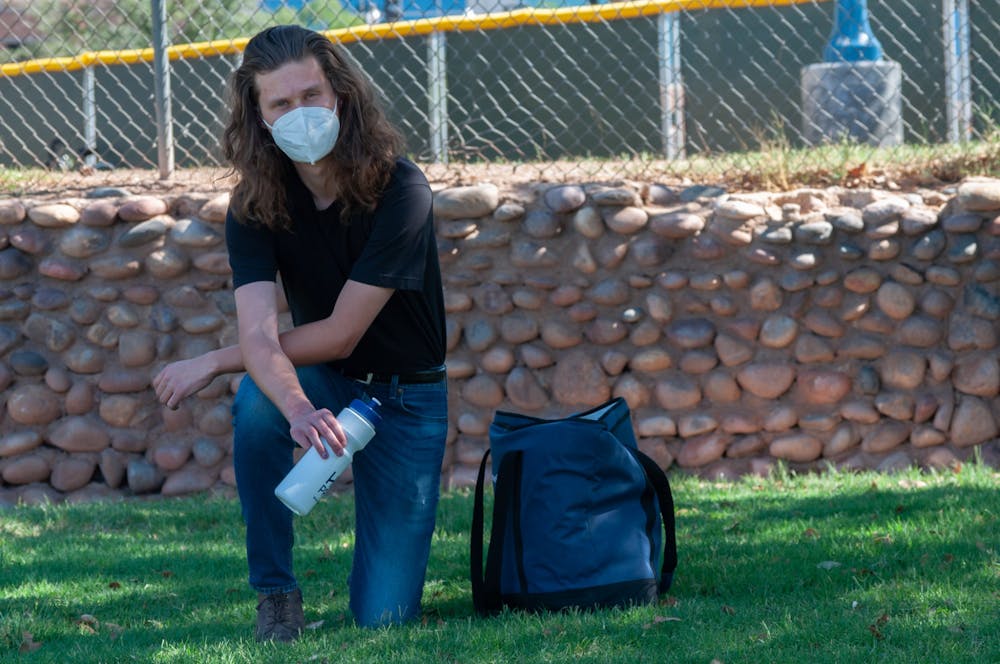At the onset of the coronavirus pandemic in March 2020, Austin Davis and Eddie Chavez Calderon, both members of Arizona Jews for Justice, visited people in Phoenix's unsheltered community to give them water bottles and face masks.
After Davis, a senior studying creative writing, and Chavez Calderon formed relationships with people in what is referred to as the "the zone," an industrial area southwest of downtown Phoenix where hundreds of unsheltered individuals live in tents, both quickly realized they could provide more than those two items.
Later that spring, those interactions inspired Davis to create AZ HUGS for the Houseless, a project of Arizona Jews for Justice with a mission to "spread dignity, respect, understanding, friendship, solidarity, empathy, and love to those living on the streets," according to its website.
"One thing I try to talk to more people about is to try to have conversations with those on the streets," Davis said. "If you don't have any money to give someone, your time is extremely valuable. Stopping and smiling and asking how they are doing, listening to their story."
According to a Maricopa Association of Governments report, over 7,400 people were experiencing homelessness in Maricopa County in January 2020. The county's number of unsheltered people, defined as people who slept on streets or "another place not meant for human habitation," has increased by over 1,700 since 2017.
AZ HUGS for the Houseless provides various services to serve people who are unsheltered in the Phoenix area, including a wish-granting service where people can ask for specific goods that volunteers aim to provide. Chavez Calderon said people have requested things from fiction books to musical instruments and art supplies.
"When we give someone something they specifically ask for, such as a coloring book, we make their lives better," Chavez Calderon said. "That for us is a win, and brings a little more humanity into the world."
Multiple community partnerships help AZ HUGS for the Houseless's mission of assisting Phoenix's unsheltered community. Partners of the organization include Salad and Go, a restaurant that donates healthy meals; Sonoran Prevention Works, a group that donates overdose reversal drugs; and Project Humanities, an ASU initiative that helps provide essential items to the unsheltered community.
Neal Lester, founding director of Project Humanities and foundation professor of English at ASU, said the initiative works with AZ HUGS for the Houseless by having its volunteers help compile care packages, including items such as toiletries, toothbrushes, and deodorant, and sending them to Davis for distribution.
Even though AZ HUGS for the Houseless donates a wide variety of items, water is still one of the most important they provide.
Talia Hoffer, an organizer for Arizona Jews for Justice, stressed the importance of AZ HUGS for Houseless's long-term goal of providing a sustainable, sanitary water source for unsheltered people who don't have reliable access to vital resources throughout the Valley.
"During the summers, there are so many unfortunate deaths due to Arizona's heat," Hoffer said. "Giving this community access to water dispensers and shade is a priority."
In 2020, 172 people who were houseless in Maricopa County died due to heat-related reasons, a stark increase from the 66 heat-related deaths among the houseless population in 2019, according to a report from the county's health department.
Davis recalled seeing the toll that the heat had on the unsheltered community last summer, saying he has "vivid memories of pouring ice water over people's heads as fire trucks arrived."
Other goals AZ HUGS for the Houseless has for this summer include creating frequent large-scale in-person events, along with expanding their volunteer base, Davis said.
On May 30, the project hosted a "Snow Cone Day," where six volunteers gathered to serve frozen delicacies and water to hundreds of those living in "the zone." Davis said he hopes to host similar events every week along with providing other services.
"We try to help one person at a time: If someone cuts up their leg, we will provide medicine. If someone overdoses, we will do all we can to get them an overdose reversal shot," Davis said. "Our goal is to show people that they are loved and valued and, ultimately, to restore dignity and respect to those on the streets. It is both an honor and responsibility to try to be a friend to this community."
Reach the reporter at juliekaplan@asu.edu and follow @juliedkaplan on Twitter.
Like The State Press on Facebook and follow @statepress on Twitter.
Continue supporting student journalism and donate to The State Press today.




